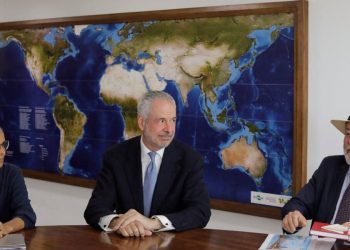There are rumors spreading across social media that claim Eugen Schwab, father of World Economic Forum founder Klaus Schwab, was a close confidante of Adolf Hitler. Depending on the source, some claim he was an industrialist who benefited from the Nazis. Others say he was a close friend of Hitler’s and even ran his own concentration camp.
Hitler's close confidant, the industrialist and fascist "Eugen Schwab" was in charge of "Escher-Wyss" and had his own concentration camp where prisoners had to work for free. They owned nothing and I suspect were bloody miserable. Klaus is an apple from the same tree. pic.twitter.com/UksIHmD2OR
— Alex Bailey
(@FUNKNA) May 24, 2022
The Schwab family is extremely powerful, so wiping the internet of damaging associations wouldn’t be nearly as hard as some might think. Little is published about Eugen Schwab that is verifiable, but it does appear that he and his business thrived during the Nazi era.
According to The Paradise:
Like Klaus and his concept of “Stakeholder Capitalism”, Eugen sought to shape the nature of cultural and social interaction and use the state to merge them with for-profit business. Now, recall the kinds of cultural and social “development” with which Eugen had been willing to collaborate during the Nazi era just a short time before. Eugen Schwab inserted himself as a beneficiary of the Nazi war machine, not because he was a Nazi or that he loved war but because the Nazi war machine was the biggest, most powerful machine available in which to insert himself.
It’s challenging to make the leap that Eugen Schwab was a Nazi. Other than the image of him in a Nazi uniform that’s circulating around social media, the best indications of attachment to the Nazis so far is that his company, like the vast majority in Nazi-held territory, collaborated with the Nazis. Those that did not were often removed or forced underground. Some participated willingly as the profit potential of a Nazi-controlled Europe was high for those the Nazis favored.
According to Bibliotecapleyades.net:
In the pre-war years of the 1930s leading up to the German annexation of Poland, Ravensburg’s Escher-Wyss factory, now managed directly by Klaus Schwab’s father, Eugen Schwab, continued to be the biggest employer in Ravensburg.
Not only was the factory a major employer in the town, but Hitler’s own Nazi party awarded the Escher-Wyss Ravensburg branch the title of “National Socialist Model Company” while Schwab was at the helm. The Nazis were potentially wooing the Swiss company for cooperation in the coming war, and their advances were eventually reciprocated.
Ravensburg was an anomaly in wartime Germany, as it was never targeted by any Allied airstrikes. The presence of the Red Cross, and a rumored agreement with various companies including Escher-Wyss, saw the allied forces publicly agree to not target the Southern German town.
It was not classified as a significant military target throughout the war and, for that reason, the town still maintains many of its original features. However, much darker things were afoot in Ravensburg once the war began.
Eugen Schwab continued to manage the “National Socialist Model Company” for Escher-Wyss, and the Swiss company would aid the Nazi Wermacht produce significant weapons of war as well as more basic armaments.
The Escher-Wyss company was a leader in large turbine technology for hydroelectric dams and power plants, but they also manufactured parts for German fighter planes. They were also intimately involved in much more sinister projects happening behind the scenes which, if completed, could have changed the outcome of World War II.
Other than rumors, we do not know for sure where Eugen Schwab stood on the Nazi-collaboration scale. Those of us who know Klaus Schwab is an evil globalist elite would love to find a direct attachment to Nazism, but right now there’s no definitive proof. All we have is speculation, but it’s conspicuous that thus far there have been no fact-checkers debunking the rumor. Someone knows something, and if I were forced to lean toward a conclusion I think it’s very possible Klaus Schwab’s father was an active and willing Nazi collaborator.
Then again, I’m biased.











